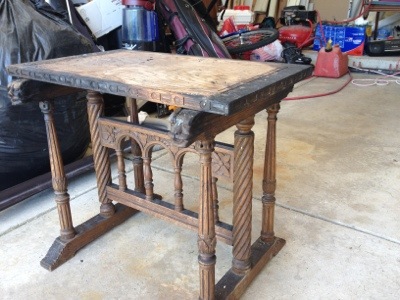We get a lot of questions at Wood Menders every week about should you or shouldn’t you restore or repair your antiques. The quick answer it depends. Here is a take from another expert:
Lots of people wonder if they should buy damaged antiques and collectibles, and there’s no question that condition and value most certainly go hand in hand.
But pieces often seem like such a fantastic deal when offered at bargain prices compared to similar items in good to excellent condition. And, quite frankly, being in that situation it’s awfully tempting to take a gamble even if you’ve been taught time and a gain to avoid damaged pieces.
So what’s the answer? That piece of the to buy or not to buy puzzle lies in your objective for the item in question.
You’re Just Purchasing a Decorative Item
You’re attracted to a Roseville vase with a repaired handle being offered to you at a price of $60, for instance. It would be worth several hundred if it were in excellent condition. The easiest thing to do is decide if it will bring you $60 worth of decorative enjoyment during the time that you own and display it. If so, it’s a good deal and buying it makes sense.
In other words, if you bought a brand new vase for $60 at a local department store and it wasn’t worth much as a used decorative item a few years from now, would you be alright with that? If so, buy the repaired vintage vase and enjoy it for as long as it fits in with your decorating scheme without worrying about the minimal yet devaluing damage. Chances are no one will notice the flaw unless you point it out to them anyway.
You Intend to Sell the Item Later
One of the most attractive aspects of buying antiques and collectibles in the first place is being able to get your money back out of them if you ever decide to sell.
With most new furniture and decorative objects, they’re simply used household goods and worth a fraction of what you paid for them after you enjoy them for a few years. There are certainly no guarantees, especially if you overpaid to begin with, but by and large an antique or collectible is going to hold its value better than a new item. If you’re lucky, it will greatly appreciate in value over time.
But, the caveat here is that those items needed to be in very good to excellent, if not mint, condition when you purchased them. You also have to care for them properly to avoid ruining and devaluing them.
If you’re thinking you might want to resell that aforementioned $60 vase in the future, it may not be such a great investment since it will likely be hard to market it later. Others will give pause then just as you did, or should have done, when you took possession of it.
There’s also the issue of passing along a broken item to your family at some point in the future. If that notion bothers you, it would be best to invest in a similar item in very good to excellent condition, even mint if you can find/afford it. And ultimately, this is the best way to approach most antiques shopping in the long run. Following the age old advice to buy the best you can afford will always ring true.
What is your take? Should you or shouldn’t you repair your damaged antiques?
Until next time – Dan @ Wood Menders
Source: Pamela Wiggins – http://antiques.about.com/od/valuingantiquesonline/a/Buy-Damaged-Antiques062812.htm



